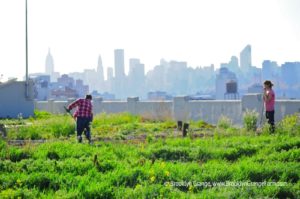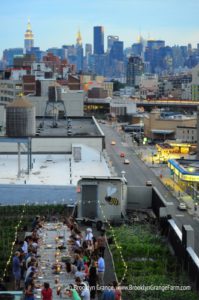
© Brooklyn Grange, BrooklynGrangeFarm.com
“Who can tell me the difference between a farm and a zoo?” The question was directed at a Kindergarten class in New York City in preparation for a visit to an upstate farm. Zadie raised her hand immediately. She had been on a farm in Brooklyn lots of times, and she knew. “Farms have elevators,” she said, “and zoos don’t.” It was not the answer her teacher was expecting.
Urban Agriculture, which has had a renaissance in recent years, is a reaction to three problems: declining health, environmental degradation, and social injustice. As Urban Ag increasingly crosses over into the mainstream, some have raised doubts about its ability to meaningfully impact such large-scale problems. Studies in cities like Boston have shown only minor reductions on emissions, land use, and food supply—no surprise given the high prices of urban real-estate. Without the ability to easily scale to a significant size, urban farms are hard pressed to knoch larger industrial operations from their dominant positions, a fact that makes tackling the many problems of our current food system an uphill battle.
Food Systems And Your Health – The Educational Mission
Anastasia Cole Plakias, Vice President and founding partner at Brooklyn Grange has heard these critiques. But for her, they are too small a lens through which to evaluate the benefits of Urban Agriculture. In her view, the power of an urban farm is not measured by size and production alone but also—and perhaps more so—by its ability to get people thinking. “When you step out onto our roof you are confronted with an expansive, productive farmland juxtaposed against this city skyline,” Cole Plakias says. “It is jarring for people. It asks them to reimagine what farms and cities look like.” The experience prompts visitors to ask questions about themselves, about where and how they live, and about the systems that they simply take for granted. That, Cole Plakias emphasizes, is the point.

© Brooklyn Grange, BrooklynGrangeFarm.com
Take food for example. Nutrition is a key component of health, but a healthy diet is about more than just individual choices. It is also about the influence of systems that are driven as much by economics and politics as they are by farmers or by wellness considerations. In the US, $20 billion tax-dollars per year go to agriculture, mostly through the massive—and little talked about—Farm Bill. Research by the Environmental Working Group into where this money goes has shown that the lion’s share ends up in the hands of large-scale, industrial agriculture firms. These operation produce the bulk of American’s commodity crops like corn and soybeans, which become abundant and inexpensive raw materials for use in processed foods. For Cole Plakias the upshot is pretty straightforward. “We’ve made heavily processed foods incredibly inexpensive at the cost of our health,” she laments. Reversing the situation will require awareness and the ability to imagine a better alternative—two things Brooklyn Grange was created to deliver.
This is why the farm, on top of the extremely difficult work of maintaining a profitable agriculture business, is heavily invested in providing tours, workshops, and social events at their space. These educational programs are a chance to reflect on the systems we live in, especially when it comes to food. “In cities things just appear as if by magic. There is nothing in the system that asks you to think about how things get to you or who gets them there,” Cole Plakias says. Up on a rooftop, knee-deep in tomato plants, it is difficult to think about anything else.
So far, the educational mission of Brooklyn Grange seems to be working. People love the opportunity to see and learn hands on, especially children. In 2010 when Brooklyn Grange launched, the publicity caught the attention of local schools who soon began requesting to bring classes. Eventually, the farm became such a popular field trip destination that an entirely new and separate non-profit sister organization, called City Growers, was created to serve the demand. The City Growers mission to “empower young people to envision a greener and healthier future” is, in Cole Plakias’ eyes, one of the key points to farming in the middle of a city. It is a chance to change the expectations of a whole new generation—to teach children like Zadie that some farms are on rooftops and you need an elevator to reach them. “I hope we can raise a generation of kids just like Zadie,” Cole Plakias beams.
Urban Ag Is More Than Pie-In-The-Sky – The Greenspace Mission
While the educational part of her work is a source of great pride, Cole Plakias also stresses that it’s not just about idealism. Besides being a financially sustainable farm with an educational mission, Brooklyn Grange also has a direct and measurable impact on the city. New York, like many urban areas across the country is growing. As it does it sprawls outward, laying acre after acre of concrete in its path. Such intensive urbanization comes with ecological problems like drainage issues, island heat retention, and of course habitat loss. The challenges are significant enough that the Mayor’s Office of Sustainability has an overall plan, called OneNYC, to combat them ane one part of that plan is the promotion of urban greenspace. In fact, a 2008 tax abatement program specifically for green rooftops helped Brooklyn Grange get started. All of which is to say that Brooklyn Grange is both an agriculture business as well as a much needed part of city’s ecological infrastructure.
And their contribution to infrastructure is not limited to the two rooftops that they currently occupy. Cole Plakias and her partners gained a lot of experience turning a rooftop into thriving farmland and, ever the entrepreneurs, they have since turned that expertise into a successful consulting service helping third parties design, build, and maintain greenspace. To date, they have worked with a wide range of cities and organizations both domestically and internationally, and they anticipate further growth in this part of their business, all of which helps to drive the creation of more greenspace in a way that cities might not be able to do as well on their own. “Our parks department cannot be expected to create greenspace alone,” Cole Plakias says. “We have to step up as communities to find sustainable solutions to these problems.” Their consultancy rises to the challenge.
——
So does Urban Agriculture make a difference, or is it just for show? Cole Plakias believes Brooklyn Grange shows that the impact of a mission driven business, especially these days, can’t be measured by crunching numbers. Their impact goes beyond the size of their fields or the number of bushels sold. A socially conscious business reaches out and pushes the boundaries of their core product. They create networks, they educate, and they make spaces where a different vision of business can be experienced. It asks us to consider our world now, and what the world could be in the future. “That’s a lot to ask when it’s hard enough just taking care of yourself,” Cole Plakias says, but an hour on a rooftop in Brooklyn can make it happen.
To learn more about Brooklyn Grange’s story, check out the book by Anastasia Cole Plakias, The Farm on the Roof.
